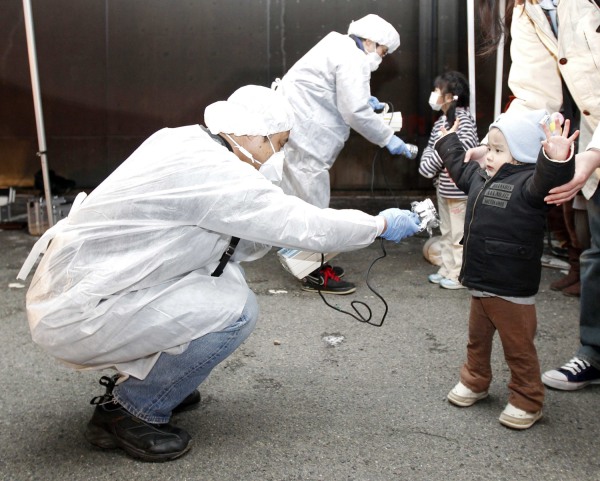Welcome to DU!
The truly grassroots left-of-center political community where regular people, not algorithms, drive the discussions and set the standards.
Join the community:
Create a free account
Support DU (and get rid of ads!):
Become a Star Member
Latest Breaking News
General Discussion
The DU Lounge
All Forums
Issue Forums
Culture Forums
Alliance Forums
Region Forums
Support Forums
Help & Search
General Discussion
Related: Editorials & Other Articles, Issue Forums, Alliance Forums, Region ForumsFukushima: Fallout of fear
http://www.nature.com/news/fukushima-fallout-of-fear-1.12194This is a great article for people that want to go deeper into the real crisis that many Japanese are undergoing.
Fukushima: Fallout of fear
After the Fukushima nuclear disaster, Japan kept people safe from the physical effects of radiation — but not from the psychological impacts.
For nearly two years, Kenichi and his family have been refugees from the worst nuclear disaster in 25 years. On 11 March 2011, a giant earthquake struck off the northeast coast of Japan, sending a 13-metre-high wall of water into the Fukushima Daiichi nuclear power station and triggering meltdowns in three of the six reactors. The next day, just hours before the Unit 1 reactor exploded, the Togawa family fled their home 10 kilometres from the plant. Today, they live in a tiny flat outside the evacuation zone — one of dozens in a series of slate-grey temporary buildings in the northeast section of Fukushima prefecture. The five Togawas are bundled into three rooms totalling just 30 square metres, with windows poorly insulated against the winter winds.
In the immediate aftermath of the nuclear accident, public-health experts worried about the possible risk from radiation. Subsequent analyses have shown that the prompt, if frantic, evacuation of areas around the reactors probably limited the public’s exposure to a relatively safe level (see ‘The evacuation zones’). But uncertainty, isolation and fears about radioactivity’s invisible threat are jeopardizing the mental health of the 210,000 residents who fled from the nuclear disaster.
Researchers and clinicians are trying to assess and mitigate the problems, but it is unclear whether the Japanese government has the will, or the money, to provide the necessary support. Nor is it certain that the evacuees will accept any help, given their distrust of the government and their reluctance to discuss mental problems. This combination, researchers fear, could drive up rates of anxiety, substance abuse and depression.
The nuclear evacuees face a more difficult future than the survivors of the tsunami, which left nearly 20,000 dead or missing and caused billions of dollars in damage. “The tsunami-area people seem to be improving; they have more positive attitudes about the future,” says Hirooki Yabe, a neuropsychiatrist at Fukushima Medical University, who has been working with both groups. Nuclear evacuees “are becoming more depressed day by day”.
-----------------------
Related Article:
Fukushima evacuation has killed more than earthquake and tsunami, survey says
http://worldnews.nbcnews.com/_news/2013/09/10/20420833-fukushima-evacuation-has-killed-more-than-earthquake-and-tsunami-survey-says?lite

More people have now died because of the Fukushima evacuation process than were killed in the region by the 2011 Japanese earthquake and tsunami which caused the displacement, a survey said.
Some 300,000 people evacuated their homes in the prefecture after the disaster caused multiple meltdowns at the Fukushima Daiichi nuclear plant, according to Red Cross figures.
A survey by popular Japanese newspaper Mainichi Shimbun said Monday that deaths relating to this displacement – around 1,600 – have surpassed the number killed in the region in the original disaster.
Close to 16,000 people were killed across Japan as a direct result of the earthquake and tsunami in 2011. According to the Mainichi report, 1,599 of these deaths were in the Fukushima Prefecture.
Causes of death in the aftermath have included “fatigue” due to conditions in evacuation centers, exhaustion from relocating, and illness resulting from hospital closures. The survey also said a number of suicides had been attributed to the ordeal.
InfoView thread info, including edit history
TrashPut this thread in your Trash Can (My DU » Trash Can)
BookmarkAdd this thread to your Bookmarks (My DU » Bookmarks)
3 replies, 1313 views
ShareGet links to this post and/or share on social media
AlertAlert this post for a rule violation
PowersThere are no powers you can use on this post
EditCannot edit other people's posts
ReplyReply to this post
EditCannot edit other people's posts
Rec (3)
ReplyReply to this post
3 replies
 = new reply since forum marked as read
Highlight:
NoneDon't highlight anything
5 newestHighlight 5 most recent replies
= new reply since forum marked as read
Highlight:
NoneDon't highlight anything
5 newestHighlight 5 most recent replies
Fukushima: Fallout of fear (Original Post)
Bonobo
Dec 2013
OP
Demo_Chris
(6,234 posts)1. rec. Good read. nt
Bonobo
(29,257 posts)2. It is a good read, so I recommend it on that level as well. Thanks. nt
Last edited Sat Dec 21, 2013, 01:08 PM - Edit history (1)
Demo_Chris
(6,234 posts)3. Kick. Artiles like this might be less sensational than the "World Ending OMG" sort usually posted...
But then the reality of suffering is usually a painful muddle slog rather than a Hollywood blockbuster. These, and others like them, are the people suffering now. Like all the victims of the Great Earthquake and Tsunami they need our help. We can only hope that it is not too late.